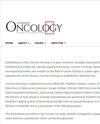An Ideal Intervention for Cancer-Related Fatigue: Qualitative Findings from Patients, Community Partners, and Healthcare Providers
IF 2.8
4区 医学
Q2 ONCOLOGY
引用次数: 0
Abstract
Patients consistently rate cancer-related fatigue (CrF) as the most prevalent and debilitating symptom. CrF is an important but often neglected patient concern, partly due to barriers to implementing evidence-based interventions. This study explored what an ideal intervention for CrF would look like from the perspectives of different stakeholders and the barriers to its implementation. Three participant populations were recruited: healthcare providers (HCPs; n = 32), community support providers (CSPs; n = 14), and cancer patients (n = 16). Data were collected via nine focus groups and four semi-structured interviews. Data were coded into themes using content analysis. Two main themes emerged around addressing CrF: “It takes a village” and “This will not be easy”. Participants discussed an intervention for CrF could be anywhere, offered by anyone and everyone, and provided early and frequently throughout the cancer experience and could include peer support, psychoeducation, physical activity, mind–body interventions, and interdisciplinary care. Patients, HCPs, and CSPs described several potential barriers to implementation, including patient barriers (i.e., patient variability, accessibility, online literacy, and overload of information) and systems barriers (i.e., costs, lack of HCP knowledge, system insufficiency, and time). As CrF is a common post-treatment symptom, it is imperative to offer patients adequate support to manage CrF. This study lays the groundwork for the implementation of a patient-centered intervention for CrF in Canada and possibly elsewhere.癌症相关疲劳的理想干预措施:来自患者、社区合作伙伴和医疗服务提供者的定性研究结果
患者一直认为与癌症相关的疲劳(CrF)是最普遍、最令人衰弱的症状。CrF是患者关心的一个重要问题,但却经常被忽视,部分原因是实施循证干预措施存在障碍。本研究从不同利益相关者的角度出发,探讨了理想的CrF干预措施是什么样的,以及实施该干预措施的障碍。研究招募了三个参与人群:医疗保健提供者(HCPs;n = 32)、社区支持提供者(CSPs;n = 14)和癌症患者(n = 16)。通过九个焦点小组和四个半结构化访谈收集数据。采用内容分析法将数据编码成主题。围绕解决 CrF 问题出现了两大主题:"这需要一个村庄 "和 "这并不容易"。参与者讨论了对 CrF 的干预,这种干预可以在任何地方进行,由任何人和每个人提供,并在整个癌症治疗过程中尽早和经常提供,干预措施可以包括同伴支持、心理教育、体育锻炼、身心干预和跨学科护理。患者、保健医生和 CSPs 描述了实施过程中可能遇到的几种障碍,包括患者障碍(即患者的可变性、可及性、在线扫盲和信息过载)和系统障碍(即成本、保健医生知识缺乏、系统不足和时间)。由于 CrF 是一种常见的治疗后症状,因此必须为患者提供足够的支持来控制 CrF。这项研究为在加拿大以及可能在其他地方实施以患者为中心的 CrF 干预措施奠定了基础。
本文章由计算机程序翻译,如有差异,请以英文原文为准。
求助全文
约1分钟内获得全文
求助全文
来源期刊

Current oncology
ONCOLOGY-
CiteScore
3.30
自引率
7.70%
发文量
664
审稿时长
1 months
期刊介绍:
Current Oncology is a peer-reviewed, Canadian-based and internationally respected journal. Current Oncology represents a multidisciplinary medium encompassing health care workers in the field of cancer therapy in Canada to report upon and to review progress in the management of this disease.
We encourage submissions from all fields of cancer medicine, including radiation oncology, surgical oncology, medical oncology, pediatric oncology, pathology, and cancer rehabilitation and survivorship. Articles published in the journal typically contain information that is relevant directly to clinical oncology practice, and have clear potential for application to the current or future practice of cancer medicine.
 求助内容:
求助内容: 应助结果提醒方式:
应助结果提醒方式:


